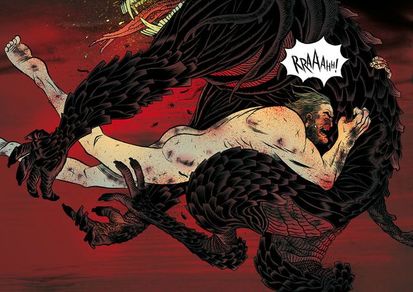
This is a course I designed and proposed for ENGL 2070, "Topics in Literature," an elective that can be repeated multiple times and that is different each time it is taught by a new instructor.
Course Syllabus and Readings
Course Description
This course explores various world mythologies and their influences on modern literatures and helps students understand and articulate the role of mythology in forming ethnic/national/cultural identity—and vice versa. It introduces students to critical theories that focus on mythology and archetype as tools for literary analysis and to basic ideas of comparative mythology. Students read excerpts of Indian, Chinese, African, Native American, and Norse mythological or legendary texts, each followed by contemporary works which engage with and draw on their respective mythological themes and content, by Indian, Chinese, Nigerian, Kiowa, and Icelandic authors and poets. The semester culminates in an in-depth reading of Neil Gaiman's American Gods, a novel that engages deeply with concepts of mythology, archetype, cultural identity, and the effects of belief and changing values on mythology.
This course also introduces students to a specific type of literary and cultural critical theory and gives students the chance to practice close reading techniques, literary analysis, participation in a literature seminar, and consistent reflection on their reading and thinking. Additionally, the final exam activity for this course requires students to write an abstract of their final paper, present a short verbal summary of their argument, and respond to questions about their paper from their peers and instructor.
Course Objectives
After this course, students should be able to:
Course Syllabus and Readings
Course Description
This course explores various world mythologies and their influences on modern literatures and helps students understand and articulate the role of mythology in forming ethnic/national/cultural identity—and vice versa. It introduces students to critical theories that focus on mythology and archetype as tools for literary analysis and to basic ideas of comparative mythology. Students read excerpts of Indian, Chinese, African, Native American, and Norse mythological or legendary texts, each followed by contemporary works which engage with and draw on their respective mythological themes and content, by Indian, Chinese, Nigerian, Kiowa, and Icelandic authors and poets. The semester culminates in an in-depth reading of Neil Gaiman's American Gods, a novel that engages deeply with concepts of mythology, archetype, cultural identity, and the effects of belief and changing values on mythology.
This course also introduces students to a specific type of literary and cultural critical theory and gives students the chance to practice close reading techniques, literary analysis, participation in a literature seminar, and consistent reflection on their reading and thinking. Additionally, the final exam activity for this course requires students to write an abstract of their final paper, present a short verbal summary of their argument, and respond to questions about their paper from their peers and instructor.
Course Objectives
After this course, students should be able to:
- define "mythology" and "archetype"
- understand and articulate the cultural and social uses of mythology
- understand and articulate the role of mythology in forming ethnic/national/cultural identity—and vice versa—and recognize that ethnicity/nationality/culture are not synonymous
- see and describe the effects of mythology and folk tales on contemporary works of fiction and poetry
- articulate how mythology has adapted to cultural change and how it functions in modern discourses
- have better insight into how certain mythologies are embedded into American culture and identity particularly and how that might differ from other global cultures
- move beyond simple euhemerism in their approach to mythology
- analyze fictional and poetic texts using the lens of archetypal/mythological literary criticism
- better understand and use close reading techniques
- participate confidently in a literary seminar course format
- compose an annotated bibliography
- write a clear, effective thesis statement
- write a 6-8 page literary analysis paper which incorporates primary and secondary sources
- write an abstract
- verbally present and defend a literary analysis argument and address questions about it from their peers
